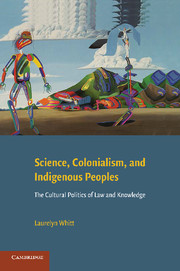Book contents
- Frontmatter
- Contents
- Preface
- Acknowledgments
- First Words
- PART I BIOCOLONIALISM AS IMPERIAL SCIENCE
- PART II THE HUMAN GENOME DIVERSITY PROJECT: A CASE STUDY
- PART III LEGITIMATION: THE RULE AND ROLE OF LAW
- 6 The Commodification of Knowledge
- 7 Intellectual Property Rights as Means and Mechanism of Imperialism
- 8 Transforming Sovereignties
- Conclusion – The Politics of Knowledge: Resistance and Recovery
- Bibliography
- Index
- References
6 - The Commodification of Knowledge
Published online by Cambridge University Press: 04 August 2010
- Frontmatter
- Contents
- Preface
- Acknowledgments
- First Words
- PART I BIOCOLONIALISM AS IMPERIAL SCIENCE
- PART II THE HUMAN GENOME DIVERSITY PROJECT: A CASE STUDY
- PART III LEGITIMATION: THE RULE AND ROLE OF LAW
- 6 The Commodification of Knowledge
- 7 Intellectual Property Rights as Means and Mechanism of Imperialism
- 8 Transforming Sovereignties
- Conclusion – The Politics of Knowledge: Resistance and Recovery
- Bibliography
- Index
- References
Summary
In the context of bioprospecting, scientific knowledge is not simply capitalized; it is politicized in the very particular sense of being inscribed with specific kinds of accountabilities, social relations and potential property claims, and interests. We might say it is neoliberalized.
– Cori HaydenThe ideology of the market, and the omnipresence of market forces, has left an indelible mark on the western conception of knowledge. Aided and abetted by the western legal system, and most strikingly by the rise of intellectual property law, knowledge has undergone a steady process of commodification. This is particularly true of knowledge produced in the microworld “factories” of western biotechnoscience, which have become crucial outposts in the establishment of an international intellectual property rights regime. Never content merely to maintain the status quo, as capitalism moves from an industrial to a global information economy, it continues to regenerate itself. Wealth, as Christopher Lind observes, is created
not primarily from the manufacture of industrial goods, but from the generation of ideas and information. As existing pools of capital seek to capture the new sources of wealth, debates about intellectual property are moving to center stage.
Although the market and market forces of late capitalism differ substantially from those envisaged by Adam Smith, they continue – notably under the banner of intellectual property law – to transform the legal system in ways that impact directly the western conception of knowledge.
- Type
- Chapter
- Information
- Science, Colonialism, and Indigenous PeoplesThe Cultural Politics of Law and Knowledge, pp. 136 - 156Publisher: Cambridge University PressPrint publication year: 2009



